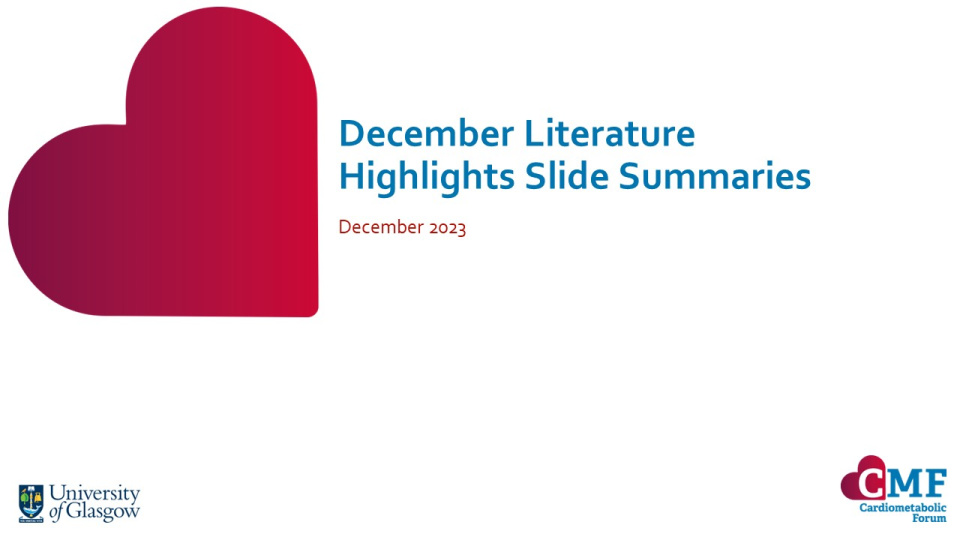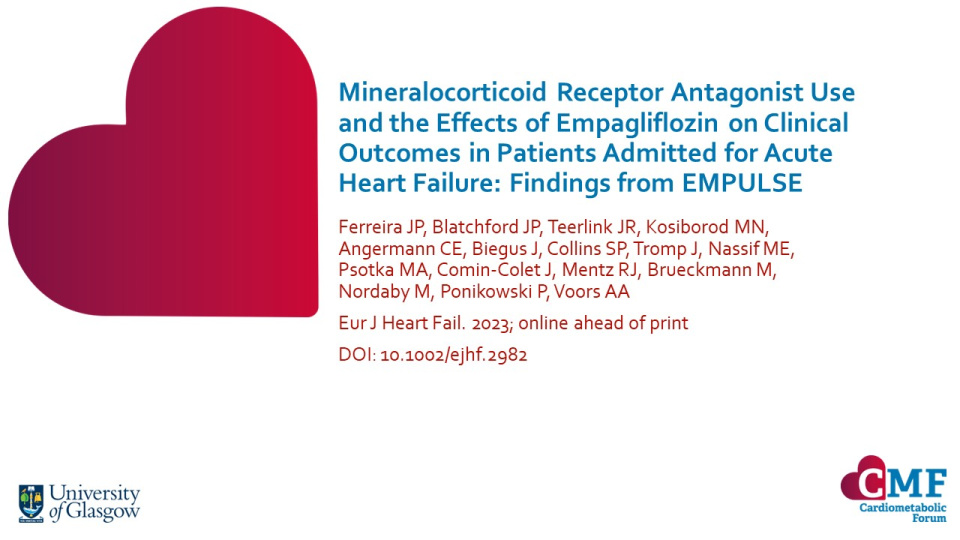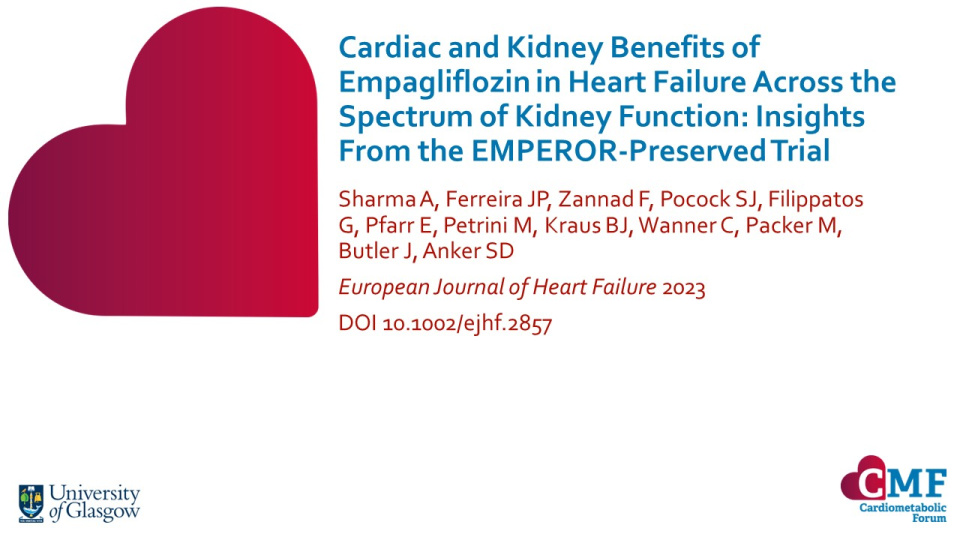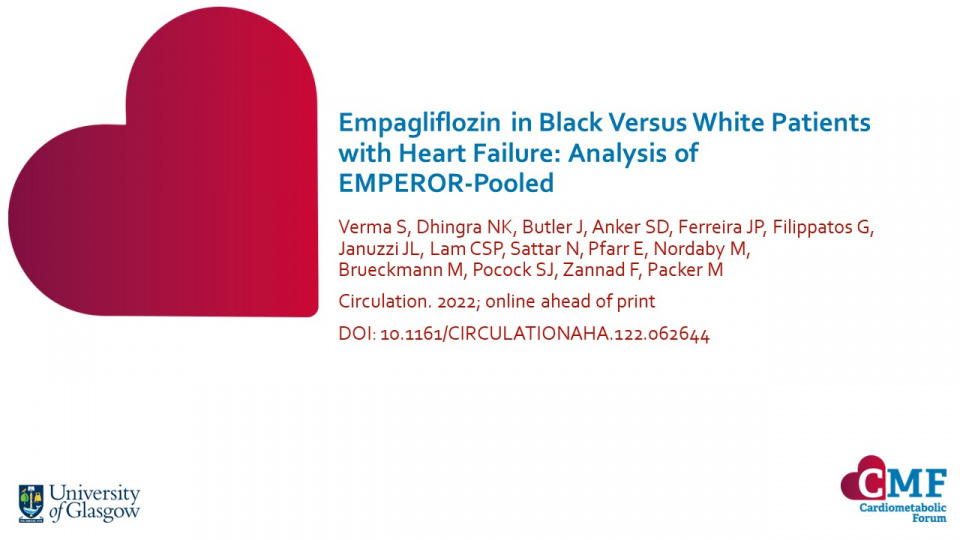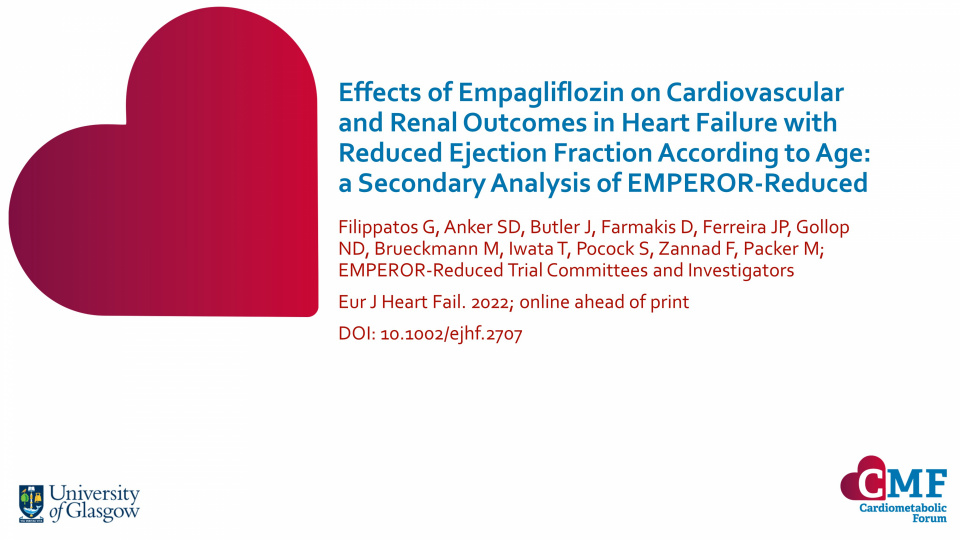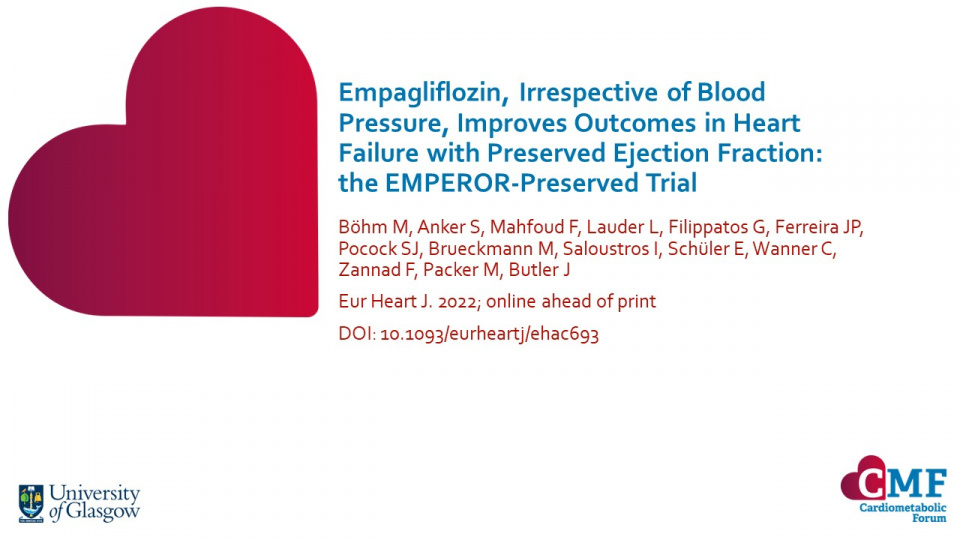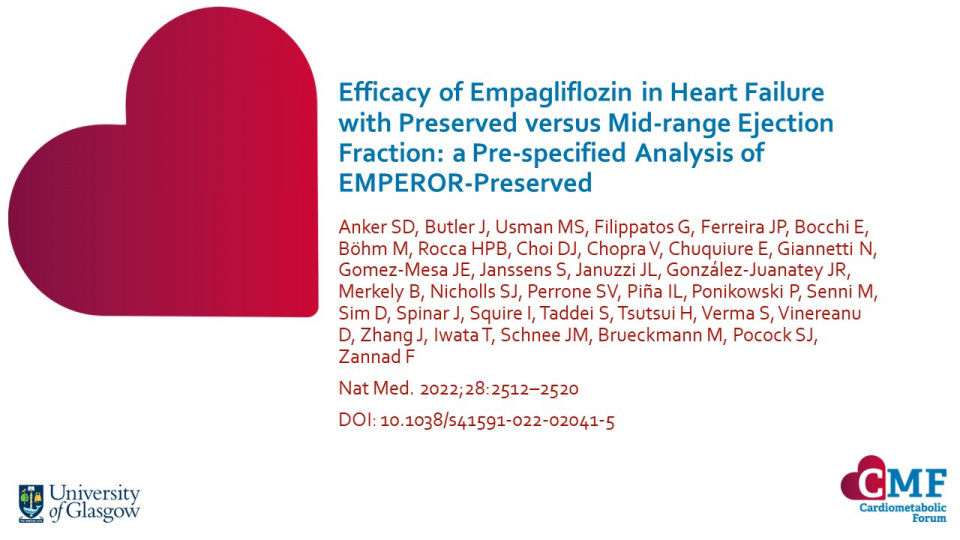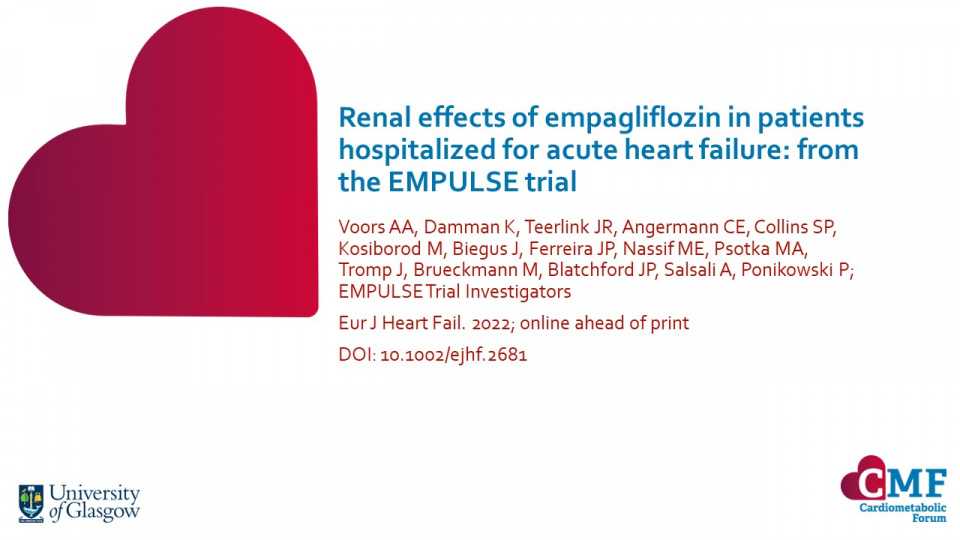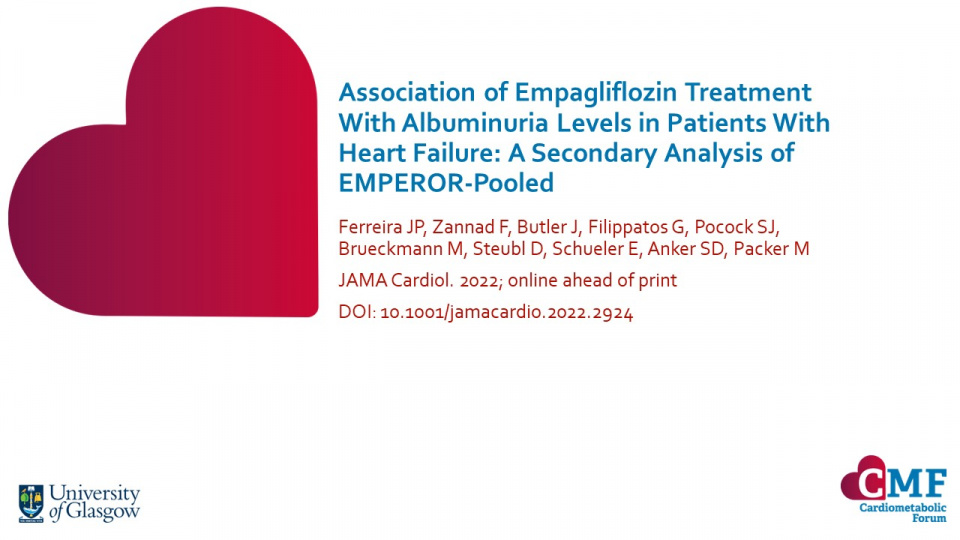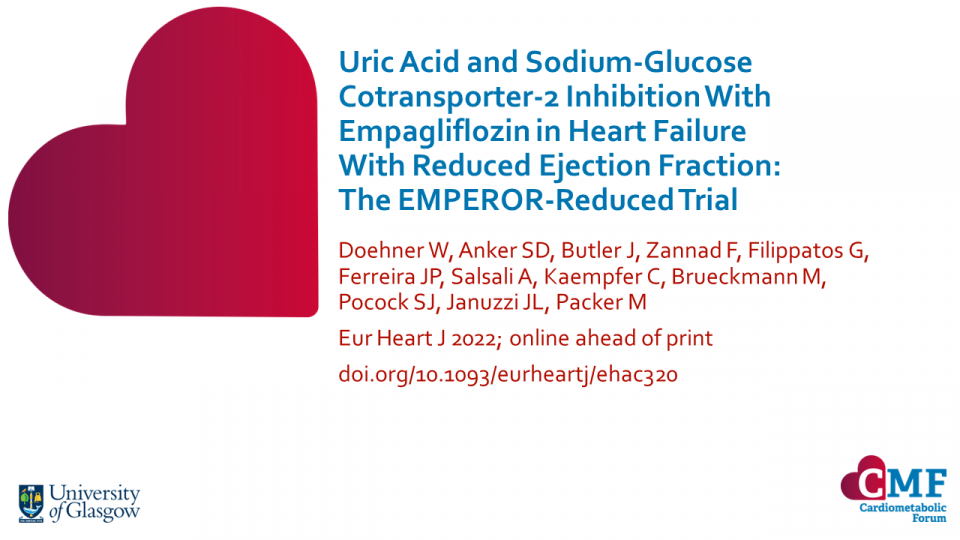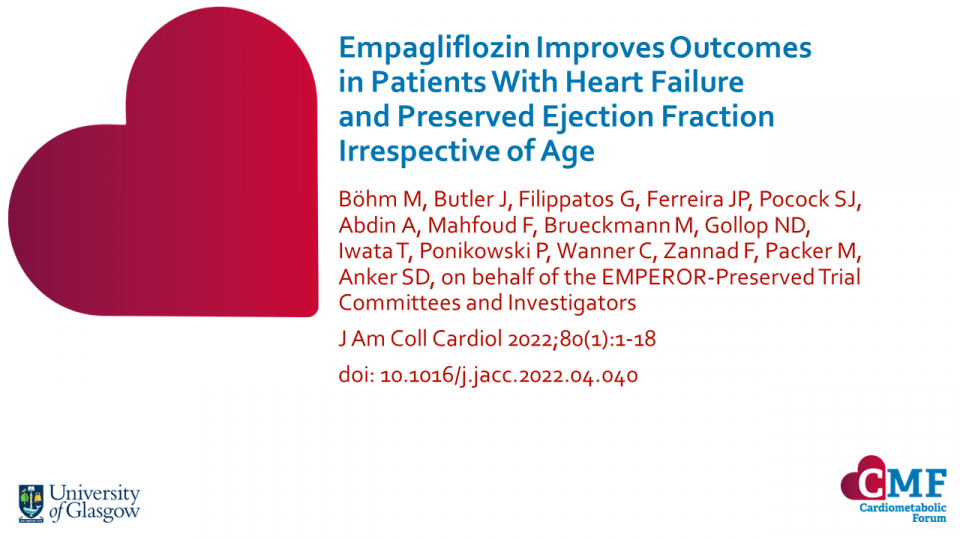Publications
Stay up to date with our literature reviews which are curated by experts to feature the most important publications released each month. Explore our publications for access to concise summary slides for your own use.
Mineralocorticoid Receptor Antagonist Use and the Effects of Empagliflozin on Clinical Outcomes in Patients Admitted for Acute Heart Failure: Findings from EMPULSE
Eur J Heart Fail. 2023; online ahead of print DOI: 10.1002/ejhf.2982
In the EMPULSE trial, empagliflozin produced greater clinical benefit than placebo in patients hospitalised for AHF. Although many patients with AHF are treated with MRAs, the interplay between empagliflozin and MRAs in AHF has not been explored. A post-hoc analysis of the EMPULSE trial aimed to evaluate the efficacy and safety of empagliflozin versus placebo according to MRA use at baseline.
Keywords:
Cardiac and Kidney Benefits of Empagliflozin in Heart Failure Across the Spectrum of Kidney Function: Insights From the EMPEROR-Preserved Trial
European Journal of Heart Failure 2023 DOI 10.1002/ejhf.2857
In the EMPEROR-Preserved trial, empagliflozin was found to improve the clinical outcomes of patients with heart failure and preserved ejection fraction (HFpEF). This pre-specified analysis sought to explore the effect of empagliflozin on cardiovascular (CV) and kidney outcomes across different levels of kidney function.
Empagliflozin in Black Versus White Patients with Heart Failure: Analysis of EMPEROR-Pooled
Circulation. 2022; online ahead of print DOI: 10.1161/CIRCULATIONAHA.122.062644
While analyses from DAPA-HF and EMPEROR-Reduced demonstrated a consistent benefit of SGLT2i in Black patients, data were limited to HFrEF and included a small number of Black patients. In the current analysis, the efficacy and safety of empagliflozin according to Black vs White race in the Americas was assessed across the spectrum of EF in EMPEROR-Pooled, a combined dataset from both EMPEROR trials.
Keywords:
Effects of Empagliflozin on Cardiovascular and Renal Outcomes in Heart Failure with Reduced Ejection Fraction According to Age: a Secondary Analysis of EMPEROR-Reduced
Eur J Heart Fail. 2022; online ahead of print DOI: 10.1002/ejhf.2707
Results from EMPEROR-Reduced demonstrated that empagliflozin improved CV and renal outcomes in patients with HFrEF, but its efficacy and safety across patient's age is not well established.
Keywords:
Empagliflozin, Irrespective of Blood Pressure, Improves Outcomes in Heart Failure with Preserved Ejection Fraction: the EMPEROR-Preserved Trial
Eur Heart J. 2022; online ahead of print DOI: 10.1093/eurheartj/ehac693
Results from EMPEROR-Preserved demonstrated that empagliflozin improved CV and renal outcomes in patients with HFpEF, but its efficacy and safety with baseline SBP is not well established.
Keywords:
Efficacy of Empagliflozin in Heart Failure with Preserved versus Mid-range Ejection Fraction: a Pre-specified Analysis of EMPEROR-Preserved
Nat Med. 2022;28:2512–2520 DOI: 10.1038/s41591-022-02041-5
Results from EMPEROR-Preserved demonstrated that empagliflozin improved CV death and HF hospitalisation – the primary outcome – in patients with HF and LVEF >40%. This pre-specified analysis of EMPEROR-Preserved aimed to evaluate the effect of empagliflozin in patients with HFpEF (LVEF ≥50%) compared with patients who had HFmrEF (LVEF 41–49%).
Keywords:
Renal effects of empagliflozin in patients hospitalized for acute heart failure: from the EMPULSE trial
Eur J Heart Fail. 2022; online ahead of print DOI: 10.1002/ejhf.2681
In a post-hoc analysis of EMPULSE in patients with acute heart failure (AHF), the clinical benefit of empagliflozin was consistent regardless of baseline renal function.
In the primary analysis of EMPULSE trial, initiation of empagliflozin in patients hospitalised for acute HF resulted in clinical benefit (a composite of all-cause death, number of HF events and time to first HF event and quality of life) at 90 days. However, the effects of empagliflozin and other sodium-glucose cotransporter-2 inhibitors (SGLT2i) on renal function during a hospital admission for acute HF remain largely unknown.
Association of Empagliflozin Treatment With Albuminuria Levels in Patients With Heart Failure: A Secondary Analysis of EMPEROR-Pooled
JAMA Cardiol. 2022; online ahead of print DOI: 10.1001/jamacardio.2022.2924
In a post-hoc analysis of EMPEROR-Pooled, empagliflozin was associated with a reduction in the primary outcome irrespective of albuminuria levels at baseline compared with placebo, and there was reduced progression to macroalbuminuria and reversion of macroalbuminuria.
Uric Acid and Sodium-Glucose Cotransporter-2 Inhibition With Empagliflozin in Heart Failure With Reduced Ejection Fraction: The EMPEROR-Reduced Trial
Eur Heart J 2022; online ahead of print doi.org/10.1093/eurheartj/ehac320
Hyperuricaemia is common in heart failure (HF) and is an independent predictor of advanced disease severity and increased mortality. This analysis from EMPEROR-Reduced showed that empagliflozin induced a rapid and sustained reduction of both serum uric acid (SUA) and of clinical events related to hyperuricaemia.
Empagliflozin Improves Outcomes in Patients With Heart Failure and Preserved Ejection Fraction Irrespective of Age
J Am Coll Cardiol 2022;80(1):1-18 doi: 10.1016/j.jacc.2022.04.040
Sodium-glucose cotransporter-2 inhibitors (SGLT2i) reduce cardiovascular death and hospitalisation for heart failure (HHF) in patients with HFpEF, and are recommended in recent guidelines for heart failure with reduced ejection fraction (HFrEF), supported by Class IA evidence. Typically, HFpEF patients are older than HFrEF, and have a higher mortality risk associated with older age, while the risk for cardiovascular death is lower than in HFrEF. Until now, the treatment effects and safety of SGLT2i in relation to age have not been studied. This prespecified analysis of the EMPEROR-Preserved trial examined the interplay of age and empagliflozin treatment effects.
For patients on placebo, the incidence of primary outcomes and cardiovascular death increased with age. In contrast, empagliflozin reduced the primary outcome, first HHF, and first and recurrent HHF across all age groups. Empagliflozin also improved health-related quality of life, and attenuated the decline of eGFR without age interaction. Additionally, there were no clinically relevant differences in AEs between empagliflozin and placebo across the age groups, and elderly patients tolerated the treatment well.

